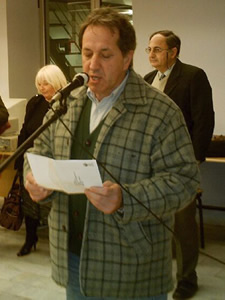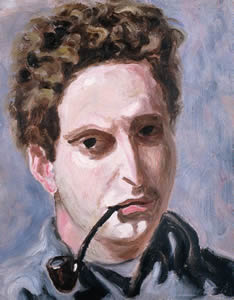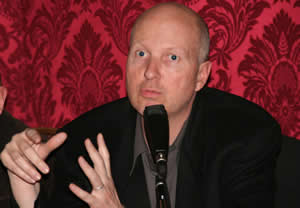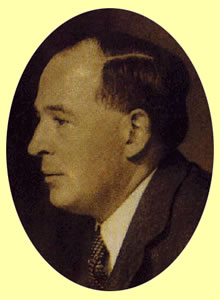De Engelse dichter en schrijver Mario Petrucci werd geboren op 29 november 1958 in Londen. Zie ook alle tags voor Mario Petrucci op dit blog.
Uit: Curates and bishops
“W.H. Auden once described being among scientists as feeling like a shabby curate who’d strayed into a room full of dukes. When I accepted the post as the first ever poet in residence at BBC Radio 3, I developed a mild case of nerves. Not full-blown duodenal heave; more a queasy sense of being a slightly shabby wordsmith among the inveterately glossolalic.
Talking. Radio people are all so bloody good at it. Of course, like Auden, I was wrong to feel that way. At the Royal Philharmonic Society awards ceremony in 2004, the briljant young conductor Ilan Volkov described Radio 3 as “family”. Certainly, I was made to feel as far from shabby as one can imagine. Almost like family – though I knew from the outset it was something I’d also have to earn. Perhaps I can push my luck here and ask (hailing, as I do, from southern Italy) whether I joined the BBC family, or they mine? It’s certainly in the balance as to which is larger. Talking of families, my emotional understanding of radio (and of opera) probably began in an Italian family kitchen. Everyone talking at once – and yet everyone perfectly understood. It was a miraculous example of a multiple cross-talk system with no tuning facility. And no volume control.
Anyway, those initial nerves quickly melted away. So much so, that I seriously wondered whether I should take in a small cylinder of helium (from my lab days) and gulp a lungful before going on air, just to give the whole thing a Donald Duck soprano shake-up. More sensibly, I’m wondering what I did to end up waist-deep in a writer’s paradise: working with a community deeply attuned to the use of words and the subtleties of music. I also have to wonder if I’m suffering from a species of literary typecasting, as the ‘frontier man’ of residencies?”

Mario Petrucci (Londen, 29 november 1958)
De Italiaanse schrijver, schilder, arts en politicus Carlo Levi werd geboren op 29 november 1902 in Turijn. Zie ook alle tags voor Carlo Levi op dit blog.
Uit: Christus kwam niet verder dan Eboli (Vertaald door Margriet Agricola)
“Dat is wellicht ook de onbewuste reden dat veel mensen er een hekel aan hebben als er een foto van hen gemaakt wordt. De Santarcangelese, die als het ware helemaal was ondergedompeld in deze magische wereld, was bang voor mijn schilderkunst. En dat was niet zozeer omdat ik haar iets zou kunnen aandoen in de trant van heksen die spelden prikken in een wassen beeldje dat hun slachtoffer voorstelt, maar vanwege de invloed en de macht die ik over haar zou hebben als ik een beeltenis aan haar zou onttrekken, zoals ik ook met de andere schilderijen die ik iedere dag maakte macht uitoefende over de personen en de dingen en de bomen en de dorpen. Ik begreep ook dat ik om deze magische vrees te overwinnen een nog sterkere magie zou moeten gebruiken dan die waar zij nu bang voor was, en dat kon niets anders zijn dan de meest directe en almachtige kracht: die van geweld. Ik dreigde dus haar te slaan en maakte een gebaar alsof, en misschien deed ik nog wel iets meer dan dat – de armen van Giulia waren trouwens zeker niet minder sterk dan de mijne. Nauwelijks had ze mijn geheven armen gezien en gevoeld, of er verscheen een gelukzalige glans op haar gezicht, terwijl haar lippen zich openden in een tevreden glimlach die haar witte wolventanden liet zien. Zoals ik al verwacht had, was niets voor haar prettiger dan overheerst te worden door een absolute macht. Zo mak als een lammetje bleef zij geduldig voor mij poseren, en tegenover de onbetwistbare argumenten van mijn macht vergat zij haar gerechtvaardigde en natuurlijke vrees. En zo kon ik haar schilderen, met de zwarte sjaal die haar antieke slangengezicht omhulde. Op een groot vierkant doek schilderde ik haar ook liggend met haar zoontje in haar armen, en als er een vorm van moederschap bestaat zonder een spoor van sentimentaliteit, dan is zij er de belichaming van; er gaat een lichamelijke en aardse gehechtheid van uit en een bittere en gelaten betrokkenheid.”

Carlo Levi (29 november 1902 – 4 januari 1975)
Zelfportret
De Belgische schrijver Jean-Philippe Toussaint werd op 29 november 1957 geboren in Brussel. Zie ook alle tags voor Jean-Philippe Toussaint op dit blog.
Uit: La Réticence
“Car Biaggi se trouvait à l’hôtel en réalité, Biaggi ne pouvait être qu’à l’hôtel s’il se trouvait à Sasuelo. Il avait du prendre une chambre à l’hôtel quelques jours avant mon arrivée dans l’intention de travailler là quelque temps complètement isolé. Ce qui faisait que, non seulement il savait que je me trouvais à Sasuelo, mais qu’il m’observait sans doute de très près depuis mon arrivée, surveillant toutes mes allées et venues avec d’autant plus de facilité qu’il se trouvait lui-même à l’intérieur de l’hôtel. Car Biaggi savait dans quelle chambre je me trouvais évidemment, et c’était lui en réalité qui s’était caché de moi pendant ces quelques jours, ne sortant de sa chambre que quand il était sur de ne pas me croiser dans les couloirs, alors que, dans le même temps, je croyais me cacher moi-même et prenais parallèlement le même type de précautions pour éviter les parages de sa maison chaque fois que je quittais l’hôtel pendant la nuit, que Biaggi aussi sortait de l’hôtel à la nuit tombée, et qu’une de ces nuits dernières il avait du m’apercevoir sur la jetée du port sous le même clair de lune que celui de cette nuit… “

Jean-Philippe Toussaint (Brussel, 29 november 1957)
De Ierse schrijver C. S. Lewis werd geboren op 29 november 1898 in Belfast. Zie ook alle tags voor C. S. Lewis op dit blog.
Uit:A Horse and His Boy
„AT first Shasta could see nothing in the valley below him but a sea of mist with a few domes and pinnacles rising from it; but as the light increased and the mist cleared away he saw more and more. A broad river divided itself into two streams and on the island between them stood the city of Tashbaan, one of the wonders of the world. Round the very edge of the island, so that the water lapped against the stone, ran high walls strengthened with so many towers that he soon gave up trying to count them. Inside the walls the island rose in a hill and every bit of that hill, up to the Tisroc’s palace and the great temple of Tash at the top, was completely covered with buildings – terrace above terrace, street above street, zigzag roads or huge flights of steps bordered with orange trees and lemon trees, roofgardens, balconies, deep archways, pillared colonnades, spires, battlements, minarets, pinnacles. And when at last the sun rose out of the sea and the great silver-plated dome of the temple flashed back its light, he was almost dazzled.
“Get on, Shasta,” Bree kept saying.
The river banks on each side of the valley were such a mass of gardens that they looked at first like forest, until you got closer and saw the white walls of innumerable houses peeping out from beneath the trees. Soon after that, Shasta noticed a delicious smell of flowers and fruit. About fifteen minutes later they were down among them, plodding on a level road with white walls on each side and trees bending over the walls.
“I say,” said Shasta in an awed voice. “This is a wonderful place!”
“I daresay,” said Bree. “But I wish we were safely through it and out at the other side. Narnia and the North!”

C.S. Lewis (29 november 1898 – 22 november 1963)
Zie voor nog meer schrijvers van de 29e november ook mijn drie blogs van 29 november 2011.
